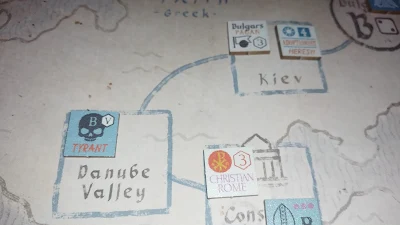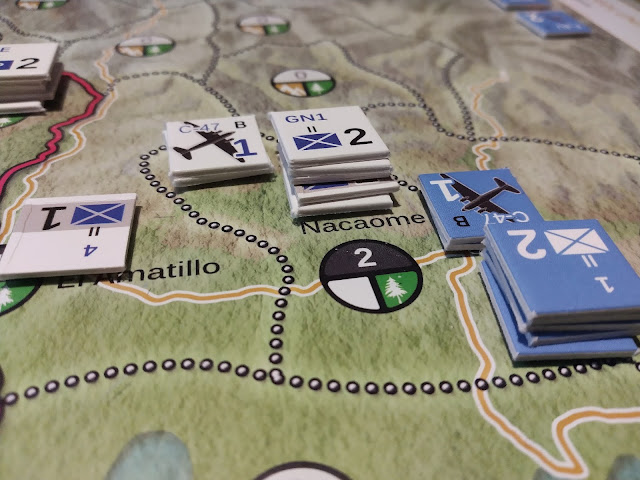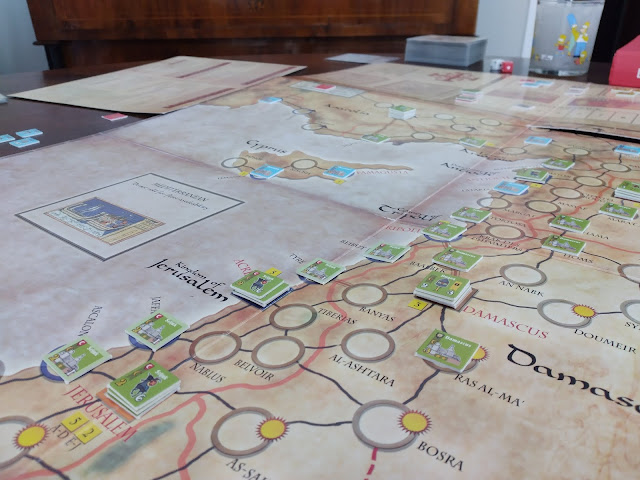The Mission. On the Copts and their natural tendency towards heresy (part 4 of 6)
Century after century the Christian religion keeps on fighting for its affirmation. Not even the bipolarism of an ever so chaotic Roman Empire, alternating stagnant heresies with bloody counter-heresies, which among other things translate into very violent intra-family feuds, manages to stem the slow spread of the opium of the people. In some way, in fact, Christians learned to live in the shadow of giants, making the repressive force of the Roman Empire their own. A triumph of adaptation, except that this glaring decadence takes us straight towards the...
Fourth era. The fall of Rome (451 AD - 630 AD)
A sudden mass migration from Northern Europe, which occurs in conjunction with an extensive socio-economic crisis affecting the entire Roman Empire, results in an ethnic war of massive proportions. It is the soldiers themselves, now largely coming from barbarian populations, who overthrow the imperial power. Rome is unable to withstand the impact of the arrival first of the Visigoths, who sack the capital, and then of the Goths, who install a ruler there, Odoacer, who chooses for himself the title of King of Italy rather than that of Emperor of the Romans, a name that evidently, for the modern man, no longer means anything.
Historically this fact is taken as a milestone to establish the fall of the Western Roman Empire, as opposed to the Eastern one, which continued to exist for centuries, led by its capital Constantinople.
In my case, however, the Empire does not break vertically, but horizontally. With a maneuver that would make the veterans of the Punic wars turn in their graves, the capital is in fact moved not to Constantinople, an un-Christian place, but to Carthage, around which the African Miaphysite Church has slowly organised. This is the most solid Christian branch among those that have developed over the course of the game, and therefore I am keen to defend it from the times to come, which already promise to be arduous. Thus the Southern Roman Empire is born. At the same time, another Christian kingdom forms independently: in the regions of Nobadia, Makuria and Alodia, largely reached by the creed, three kingdoms arise, which we will collectively call Nubia, and which embrace the Coptic Miaphysite Church. A schismatic people, of course, but whose contribution will be important to defend the epicenters of Christianity from the coming of the barbarians, who at this point, no longer kept at bay by the Romans, begin to appear from all sides.
Saxons, Bulgarians, Khazars, Turks, the Himyar clans and the Vandals in fact appear at the borders of the known world, which roughly correspond to those of the Roman Empire, and begin to exert significant pressure, hoping to secure slices of it. Barbaric peoples, I was saying, and yet some of them are even vaguely Christian: among the Saxons, for example, there is a new heresy, Arianism, a doctrine of Christian origin which fundamentally distances itself from it due to some views which I have no difficulty in defining as trivial regarding the nature of the divine Trinity, stuff that is completely incomprehensible to an atheist like me, but which must have sounded very important to the believer of the time. Also because at this point the Council of Chalcedon is organised, a farce which takes place near a Constantinople which continues to have no active Christian community. These new theories are discussed, and this could simply be translated into a mass excommunication of the Saxons if it was not for the fact that the bishops coming from the Armenian area, and from Antioch in particular, take the floor at this point, clarifying that this thing of the Trinity is serious stuff for them and, to be precise, about it they have the same opinions of the Saxons, which is why they don't agree with the decision to excommunicate them. Astonishment, insults, slaps. The excommunication arrives, but it also arrives for the entire Armenian branch. These, after having tolerated for centuries that loads of money were thrown at the Copts without a penny ever being spent on Antioch, that consequently has an almost non-existent Christian community, leave after announcing that they too will make a schism, just as the Copts, who may have ten thousand heresies under their asses but who at least don't waste time with these useless councils which, despite the name, do nothing besides dividing Christians more and more. Serious accusations, and in fact at the end of the meeting Catholics, Orthodox and Miaphysites decide to commit themselves to trying to remedy the divisions between them in the future, rather than worsening them more and more. We'll see with what results later.
While the religious debate rages, the Romans organize themselves to face foreign threats. The Roman army is moved to Mauretania Tingitana, from whose border the Vandals, who have occupied Iberia and have descended to North Africa, threaten to carry out an invasion in force. In the area of today's Dagestan settles the pagan kingdom of Sarir, led by a tyrant whose name has been lost in time. The Saxons begin to descend from the north, taking Ireland and then Britain. The Bulgarians occupy the area where the Kievan Rus will one day rise. The Himyars advance, taking Ethiopia. Nubia attempts to respond by trying to wrest control of Ethiopia from the Himyar, but fails.
 |
| Catholics really did a good job up there. |
We need to mend relations with the Arians, the Christians say, and therefore they look to the most important Aryan community on the map... the Saxons, of course, certainly not the excommunicated people of Antioch. The bishop of Belgium is sent to Britain. Here he falls in love and returns home with his bride, announcing that he wants to dedicate himself to his family. A replacement is found and sent in turn to Britain, which he manages to convert. He then heads to Ireland, where he meets the local slave communities and puts some copies of the Latin Bible into circulation among them, managing to convert them to Catholicism. Such Superman then decides that it is worth trying everything: a large sum of money is paid directly into the Saxons' coffers, and once their interest has been bought, their leaders are invited to discuss the concept of the divine Trinity. It turns out that the bishop has a great oratorical ability, because he manages to convince the Saxons, evidently disinterested, in truth, to all these mental discussions about the Trinity, to abandon Arianism and move on to Catholicism. The Christian patriarchs rejoice: the Saxons are converted.
In Antioch, offended, they consider that moving from Arianism to Catholicism is not the same as mending the schism, so they become angry and definitively begin to do things on their own. The bishop of Antioch sets out, going to the slaves of Armenia, and he independently begins to convert everyone there to Arianism.
 |
| The Roman welcoming committee prepares to offer Vandals a good service. |
Thirty years pass without the appearance of heresies, tyrants or other pleasantries. The Saxons, now Christians, advance, taking Belgium, while the Khazars descend on Alania. The Turkish peoples launch a blitzkrieg which leads them to suddenly occupy everything from the Urals to India. Given that the beating heart of Christianity, however, is in the Mediterranean basin, part of the Churches' budget is invested to found the Order of the Knights of Tingitana, who are based in Mauretania Tingitana, where they support the Roman troops in preventing the advance of the Vandals. With the same purpose, but with regard to the Himyar clans, the Order of the Knights of Alodia is also founded. Everyone has the impression that everything is about to fall apart, but they do not give up: in the general stalemate the Bible is translated into Coptic, while some copies of the New Testament in Latin circulate until they reach Spain, where finally the heirs of the scholars who centuries ago murdered Saint Peter decide to embrace Christianity.
 |
| Adoptionism explodes in Kiev. Can I do something about it? No. So, best regards. |
In this situation an old-fashioned Roman Emperor finally arises. This is Justinian, who sets himself the goal of bringing Rome back to its old glory. First step: to take back Rome, naturally. The operation is successful, and although it is not followed by any other noteworthy result, it is enough to make the barbarian peoples shit themselves, and for a few decades they do not advance further towards the Roman borders. It all seems rosy, but it's not. Justin is an "old-fashioned" emperor, we said. And in fact he is heretic. The Roman capital is now in Carthage, where if you remember that infamous sect of the Cult of Isis survives. I have to think that Justinian frequented those people there. However this may be, as usual, this situation sends bishops and archbishops into a tailspin, and for the entire duration of Justinian's (long) reign they find nothing better to do than to translate the Bible into Syriac as well. Some local priest tries to convince the scholars of Milan and the slaves of Thebes that Christianity can do for them, but he fails to achieve anything. Far beyond the Roman borders, in Kiev, on the other hand, someone finds a way to argue that, with a heretic Justinian, traditional Christianity is finished. Thus, in this already rather confusing scenario, the adoptionist heresy is born, which I didn't understand a thing of and therefore I can't explain to you what it consists of. Since Kiev is very far from my missionaries, however, I already understand that this one will remain there for a while.
Upon Justinian's death, chaos erupts again: the Göktürk horde appears, a people faithful to the god Tengri. They conquer Mongolia from the Turks, driving them back towards the Urals for a few years, until they return to descend at full throttle and regain the lost territories. The missionaries stop discussing cosmic nothingness and this time it is the Copts themselves who set the example: the Archbishop of Alexandria travels to Nobadia, a region where the Manichaeans have been freely preaching their antics for one hundred and fifty years. A common plan is identified to meet each other in these times of crisis and so the Manichaeans return to the fold, disappearing from the map. Immediately afterwards Nobadia is converted, as it is India, which however is feared could quickly return to paganism due to possible future invasions by the Turks.
 |
| The converted Saxons clash against the Franks of Chlothar I. |
The sixth century is waning, but it decides to do so with style. The Vandal hordes finally attack, smashing into the Roman and Christian defenses in Mauretania. But, at the same time, the defense of the Nubians and the knights of Alodia is not as effective: the Himyar destroy the knights, and push the border back to Makuria. On the other side of the Mediterranean basin the Saxons are about to proceed beyond Belgium, but they come up against an unexpected obstacle: Chlothar I, King of the Franks, who in the meantime had arisen in the lands formerly populated by the Gauls. He, a Christian, is particularly fond of his chair and does not let them pass. This doesn't make me happy, because I was confident in a rapid advance of the Saxons to the gates of Rome, but oh well, I tell myself that sooner or later the Franks will fall, and that we just have to wait a few turns.
 |
| Nubia defies the Himyar clans. |
Needless to say, while Nubia takes a beating and France comes alive, the Emperor, Flavius Maurice Tiberius, is a heretic. In short, the cult of Isis proves to be more popular than ever, and once again bishops and archbishops start arguing. Fortunately, Nubia is outside the borders of the Roman Empire, and therefore the Archbishop of Nobadia is not involved in these trifles. Accompanying the Nubian troops, who launch a full force attack against the Himyar able to drive them back first to Ethiopia and then into the caverns, he visits Ethiopia himself, circulating the Coptic Bible among some pagan ascetics, who having witnessed with their own eyes a military comparison between pagan and Christian ideas decide to adopt the latter. The success of the resurrection of Coptic Christianity is signed by the foundation of an imposing monastery in Makuria, the Ghazali monastery. The other Churches, jealous, even if blocked in the debates on the legitimacy of the cult of Isis, do not stand by and watch: they silently pay some groups of preachers, who, under the excuse of a pilgrimage to Ghazali, go to Makuria and Alodia, founding loyal communities there, opposed to the Coptic schism, and who according to the plan will one day take action to apply the right pressure so that it is mended. These believers will be known as Melkites, and their churches will be known as Melkite churches. The Melkites are expensive, but the more I have, the easier it will be to mend the schism.
 |
| With the foundation of the Ghazali Monastery and the birth of several Melkite Churches the Red Sea becomes a first class tourist destination. |
In the meantime, due to this continuous discussion of heresies, Christian doctrine has appeared a bit stagnant for some time. In the end, for decades, if not centuries, Christianity has locked itself in a perpetual manhunt, a continuous questioning of the orthodoxy of one-another, which only lead to divisions and no real progress in terms of the search for faith. Fortunately, a new Great Theologian appears, Gregory the Great, the bishop of Rome, who revives the debate a bit by proposing, in his seminars, a discourse that starts from those last encyclicals regarding the role of the Empire, and its army, in the affairs of the church. He offers his homily entitled "Quis custodiet ipsos custodes?", pointing out that now that the Emperor is a heretic his army risks being a loose cannon that turns against the Christians, rather than against their enemies. His operation is successful, and the Church finally gets rid of its militaristic drift: the counter of the dark ages goes back by 1, returning to 0.
 |
| The Avars appear in the Danube Valley, stealing territory from the Bulgars. |
The news that the dark ages are still far away does not interest the barbarian peoples, who are experiencing a very belligerent spring: the Bulgarians find themselves ceding a part of their territory, the Danube Valley, to the Avar people. The Saxons challenge the Kingdom of the Franks in battle, which however once again withstands the impact without flinching. The Khazars wage a decades-long war with the Unnamed of Sarir, eventually managing to take him out and take back the entire region. The Turks, having fully occupied India, proceed towards Merv, which they conquer from the Parthian Empire, which retreats, losing one of its historical regions. The Christian states are not involved in all these wars and therefore stand by and watch, while other pilgrims from non-schismatic Churches descend along the Nile, going on a pilgrimage to Ghazali, where they leave huge donations intended to be reconverted into cash on next turn, and then settle around those parts (Ethiopia, Nobadia, Alexandria), where they establish other Melkite churches.
Despite having lost much of the West, the Roman Empire still seems to be able to stand on its feet. Christianity holds. Nubia is thriving. The worst is over? Historians of the time think so. But the most astute theologians know that the real threat, the mother of all religious revolutions, is rising right now in the Middle East, and that this time the Christian kingdoms will not be ready for what is to come...
See you in a week with part 5, in which Christianity faces off against a new Abrahamic religion: Islam.
Do you want to read other stories? Click here for the full list.




Comments
Post a Comment